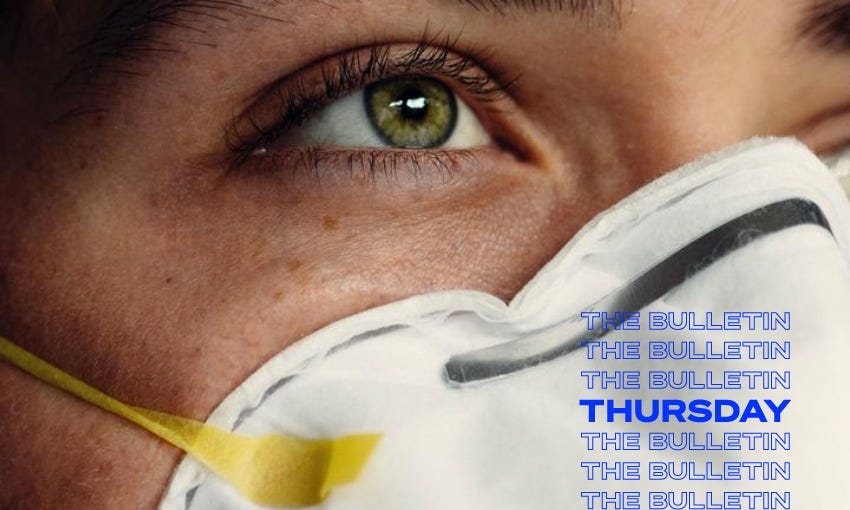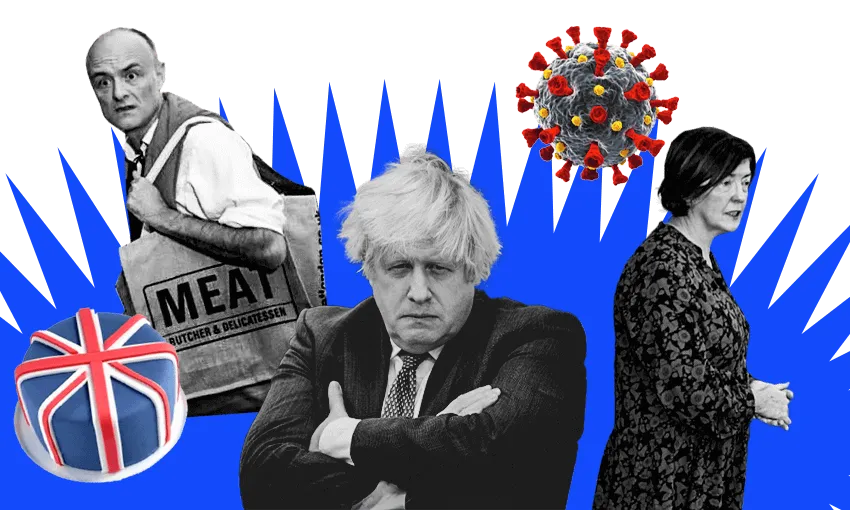New Zealand's omicron plan revealed
The isolation period for cases will be shortened and they'll be asked to notify their own close contacts in the later stages of what could be a significant outbreak
Mōrena and welcome to The Bulletin for Thursday, January 27, by Justin Giovannetti. Presented in partnership with Z Energy.
In today’s edition: Government confiscates private rapid tests; little boost to families getting a benefit; let’s not forget climate change; but first, the details on how to manage an omicron outbreak.
A three phase approach to omicron. (Griffin Wooldridge / Unsplash via RNZ)
New Zealand’s omicron plan is now clear. Since Sunday, the government has unveiled a new piece of the country’s updated Covid-19 response nearly every day. The picture is now more-or-less complete. Ayesha Verrall, the associate health minister who was an infectious diseases doctor until the 2020 election, yesterday detailed a new three phase approach to omicron. The plan expects infections to soar into the thousands, or tens of thousands of daily cases, in the coming months. The first phase, where we currently find ourselves, is quite familiar to New Zealanders. The plan’s final phase will be unlike anything the country has seen before. Stuff has detailed the three phases.
Phase one: try to stamp it out. The current phase. Largely mirrors the approach to the delta outbreak, with the addition of booster shots. People who have symptoms or are close contacts are expected to get PCR tests. Contacts will be traced by public health experts, while push notifications and updated locations of interests will help the country keep tabs on infections. Cases will isolate for 14 days, while contacts isolate for 10.
At around 1,000 daily cases, phrase one won’t be able to cope. Ashley Bloomfield told RNZ that the worst case scenario is this could happen in about two weeks.
Phase two: slow the spread. PCR tests will still be available. Most cases will be informed via text message and directed to use online tools to help contact tracing. Experts will focus on tracing high-risk events. Critical workers, those in health and maintaining supply chains, will be able to use rapid tests to return to work once their infections clear. Other cases will isolate for 10 days, while contacts isolate for 7.
Once cases are in the daily thousands, this will stop working. There aren’t firm guidelines on what will trigger any of the moves between phases.
Phase three: Self-management. PCR tests are reserved for the vulnerable, while most symptomatic people are directed to use rapid tests. Cases will need to find and notify close-contacts themselves. As a result, the ministry of health will stop publishing locations of interest and sending notifications to cases. The definition of a contact will be narrowed to someone in your home. The isolation periods remain 10 and 7, while critical workers can exit early with a rapid test.
As RNZ reports, Verrall said it’s possible phase three won’t be necessary as some countries haven’t hit the high level of cases that would bring about the need. Omicron has now only spread to a few dozen people in New Zealand.
The Spinoff’s Covid data tracker has the latest figures.
Isolation periods will be a critical factor in the coming weeks. With estimates that up to half the population will become infected with omicron, many New Zealanders could soon be looking at their calendars to figure out how long they and their families need to self-isolate. Until the country enters the second phase, that could mean up to 24 days of self-isolation for people who live with Covid-19 cases. Businesses have said they’ll struggle to cover a 24-day leave for isolation and it isn’t clear how sick leave will work for people who can’t work from home. Al Jazeera has looked at how self-isolation rules are changing around the world and New Zealand seems to be hitting the middle of the target, with some countries cutting isolation time to as few as five days while others are sticking with the WHO’s recommended 14.
Omicron means that, yet again, we at The Spinoff will be devoting significant resources to covering this enormous and complex story. If you value what we do, please consider becoming a member today. Every dollar donated is ring-fenced to support our journalism, and right now we need audience support more than ever.
Is your organisation keen to support The Spinoff? We would love to hear from you—contact us today to find out more about our organisation memberships.
Businesses say the health ministry has commandeered their rapid test shipments. A story broke early yesterday that a number of incoming orders of test kits, bought and paid for by private businesses, had been intercepted by the government. Ashley Bloomfield later explained that while no tests were requisitioned on-shore, yes the government had told international test suppliers to send all incoming orders of rapid tests to government warehouses. As Stuff reports, businesses said the tests were part of their pandemic plans to protect staff.
Bloomfield defended the move, saying the tests were now available for all New Zealanders. The associate health minister said that had the government not intervened to reroute the tests to the health ministry, they might never have been delivered to businesses due to global demand.
It’s an about-face for the government, which had banned the import of the tests until late last year and has spent most of the past few months minimising the importance of rapid results.
More than half of families with children getting little boost from higher benefits. According to RNZ a new report has found that despite increases to benefits in recent years, soaring housing costs along with Covid-19’s disruption to incomes has left many families no better off. The number of families receiving a benefit has increased from 286,225 in June 2017 to 363,497 last June, a 27% increase. The number of people receiving an accommodation supplement has also risen, but as One News reports, there’s no evidence it is fuelling an ongoing rise in rents.
A note from our partners Kiwibank: Every year, communities around the motu are propped up by extraordinary people taking time out of their own lives to make a difference. The Kiwibank Local Hero of the Year – Te Pou Toko o te Tau, recognises these people, and this year’s group of 10 semi-finalists is as strong as ever. From advocating for food rescue, to helping in the fight to end domestic violence and child poverty, each semi-finalist epitomises kindness, aroha and selfless dedication. During a tough couple of years for Aotearoa, they have connected people, given them a purpose, and given them hope at a time when those values were often in short supply. Meet the group of Kiwibank Local Hero of the Year semi-finalists on The Spinoff now.
The foreign affairs ministry tells New Zealanders to leave Ukraine. Russian military activity is increasing on the country’s border and there are growing fears of an imminent invasion. Officials in Wellington have now warned the country’s few citizens in Ukraine to consider leaving, Stuff reports. The US, Canada and the UK have ordered the families of their diplomats to leave the country, while Nato militaries have been put on alert. New Zealand does not maintain an embassy in Ukraine.
While Covid-19 is dominating the news, the climate crisis isn’t going anywhere. The omicron variant has captured the country’s attention, including in the very newsletter you are currently reading, but there are a number of important climate deadlines coming up. The Conversation writes that a triple planetary crisis is facing New Zealand, that will require action on pollution, climate change and biodiversity. About one-third of the country’s species are listed as threatened, so it’s not a theoretical exercise. New Zealand’s first emissions reduction plan is expected later this year and it could signal a deep domestic move to slash emissions.
Got some feedback about The Bulletin, or anything in the news?
Get in touch with me at thebulletin@thespinoff.co.nz
Dominic Cummings and Sue Gray play critical roles alongside Boris Johnson in the Partygate soap opera. (Montage: Tina Tiller)
Right now on The Spinoff: Toby Manhire writes a beginner’s guide to the comedy and tragedy of the Partygate scandal that could take down British PM Boris Johnson. Dylan Reeve speaks with the woman behind a viral video attacking Jacinda Ardern. Naomii Seah details how best to protect your young children against omicron. Charlotte Muru-Lanning dives into what rights you have as a worker if omicron impacts you.
New Zealand sprinter Zoe Hobbs is getting closer to the world championships. She broke the country’s 100 metre sprint record this week, with an 11.14 second run. That’s a tad faster than the 11.15 seconds she’d need to automatically qualify for the Commonwealth Games and two championships. However, as One News reports, there’s a catch. A very New Zealand catch. There was just slightly too much wind at her back, so she has to start all over again.







